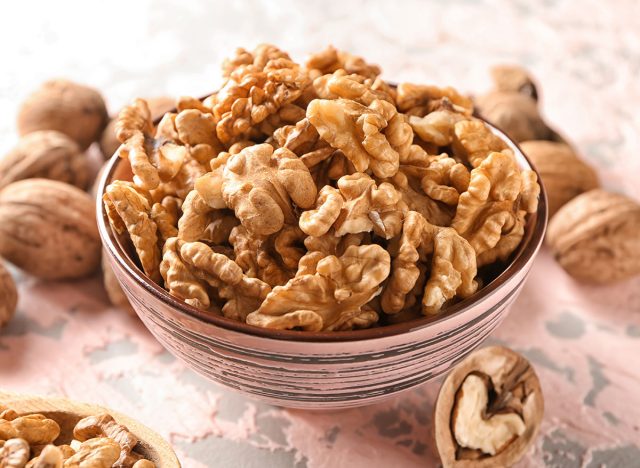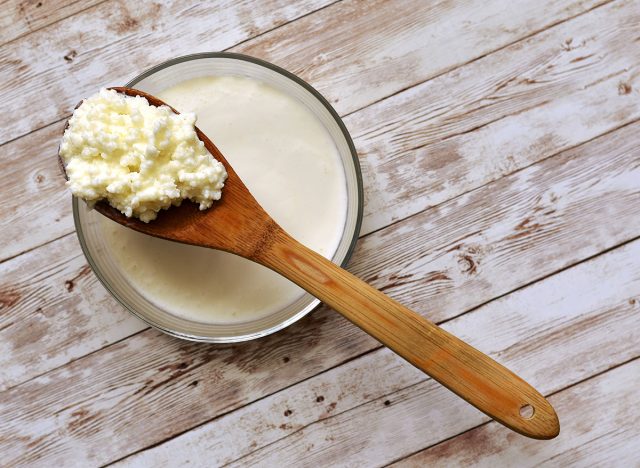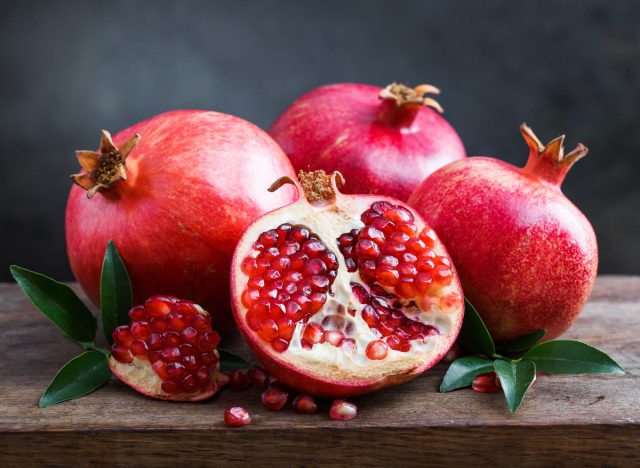Walnuts and 2 Other Foods This Dietitian Eats Before Bed To Melt Belly Fat

Many good things come as we get older like wisdom, confidence and emotional maturity, but for women, hot flashes, insomnia and mood swings also happen with age. There’s no way around it–every woman will experience menopause and although it’s different for everyone, extra belly fat is another thing many will face.
While adding a few pounds isn’t too worrisome, excess weight around the midsection is another story because it leads to bigger health problems like high blood pressure, diabetes, and inflammation, all of which increase the risk for heart disease and stroke.
Getting rid of belly fat can be challenging as hormones change and metabolism slows down, but there are ways to combat it like regular exercise, intermittent fasting, reducing stress, getting quality sleep and eating certain things before bedtime.
It’s a common belief that eating too late can cause weight gain and it can depending on what you eat. But certain foods can actually burn belly fat while you sleep.
Here are three foods Violeta Morris, MS, RDN, from Columbus, OH, The Concierge Dietitian, @conciergedietitianvioleta, recommends eating before bed.
Walnuts

Everyone knows walnuts are a good source of protein and are a healthy snack, but Morris says a handful before bed can support weight loss goals.
“A 2023 review published in Nutrients, which included randomized controlled trials and
observational studies, found that nut consumption is consistently associated with better
weight management and may help prevent long-term weight gain.”
She explains, “Although nuts are higher in fat, research shows they support weight control, likely due to their ability to increase satiety through healthy fats and protein, often displacing less nutritious, calorie-dense foods.”
Morris adds, “In one randomized controlled trial, consuming around 40 grams of walnuts (about 13–17 walnut halves) was shown to increase melatonin levels, which is a hormone that can help improve sleep quality. In short, walnuts are a bedtime win—supporting both weight control and better sleep.”
Kefir

Kefir is a high-protein, low-fat fermented dairy drink rich in beneficial probiotics that support gut health and metabolism.
Morris says, “Regular intake of fermented foods like kefir has been linked to a variety of health benefits, including improved digestion and potential support for weight loss. In a randomized controlled trial involving overweight and obese premenopausal women, both kefir and low-fat milk significantly improved lipid profiles after 8 weeks compared to standard dairy intake.
She adds, “As a dietitian, my go-to brand is Lifeway Kefir 1% Milkfat, which provides 140 calories, 18 grams of carbohydrates, and 10 grams of protein per 1-cup serving—making it a balanced, gut-friendly snack.”
Pomegranates

Pomegranates are rich in nutrients and their sweet-tangy taste can be enjoyed as juice, in savory dishes or in dessert.
According to Morris, “A recent meta-analysis found that pomegranate consumption significantly reduced body weight and BMI in adults, particularly in those with obesity, although it showed no
significant effect on waist circumference or fat mass.
She explains, “While more long-term studies are needed to determine the impact of different doses, the evidence is promising. I consider pomegranate a superfood—rich in antioxidants, vitamins, and phytonutrients that help reduce inflammation.”
Morris adds, “In fact, pomegranate juice has more antioxidant power than other common polyphenol-rich beverages, including green tea, red wine, and fruit juices like orange, grapefruit, grape, or cranberry. This matters because antioxidants play a key role in lowering oxidative stress, which is linked to inflammation, aging, insulin resistance, and poor sleep quality.”